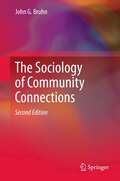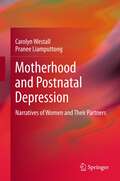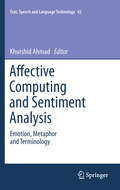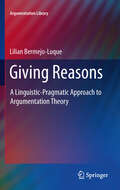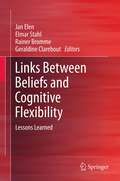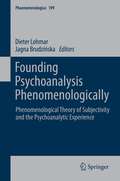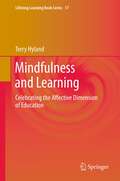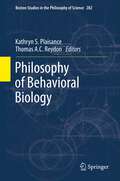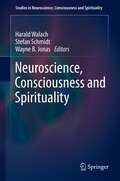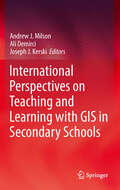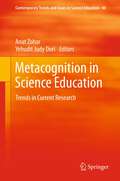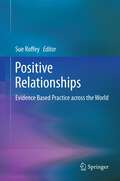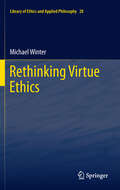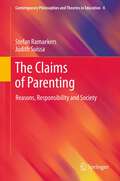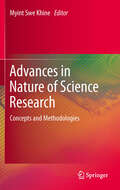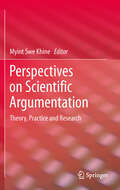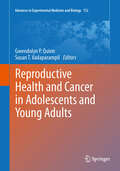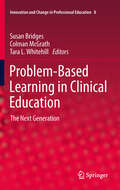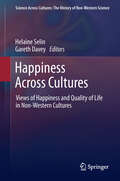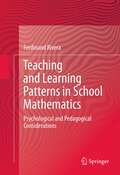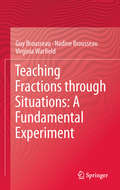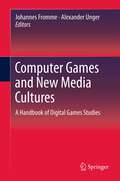- Table View
- List View
The Sociology of Community Connections
by John G. BruhnMany of our current social problems have been attributed to the breakdown or loss of community as a place and to the fragmentation of connections due to an extreme value of individualism in the Western world, particularly in the United States. Not all scholars and researchers agree that individualism and technology are the primary culprits in the loss of community as it existed in the middle decade of the 20th century. Nonetheless, people exist in groups, and connections are vital to their existence and in the daily performance of activities. The second edition of the Sociology of Community Connections will identify and help students understand community connectedness in the present and future.
Motherhood and Postnatal Depression
by Pranee Liamputtong Carolyn WestallGlobally, postnatal depression (PND) is a growing public health problem. PND affects 10 to 15% of women in Western society. It caused by a combination of biological, psychological and social factors. Two models have attempted to define and explain PND; the biomedical and the sociological models. The traditional biomedical model views PND as a medical condition which implies there is individual pathology and abnormality. Whilst the biomedical model has been the dominant model in treating PND, it has been criticized by feminist sociologists and psychologists for its rigidity in defining and explaining PND. In contrast, the psychosocial model of health acknowledges the biological factors that impact on emotional well-being, but places more emphasis on the personal and social factors that impact on emotional well-being, but places more emphasis on the personal and social factors that contribute to depressive symptoms such as gender, poverty, social disadvantage and social class. The central argument throughout this book is the importance of support before and after the birth for women's emotional well-being. This book will also include women's journeys through pregnancy, childbirth, motherhood, postnatal depression, and resolution. To date, literature has focused on women's lived experiences of PND rather than their personal journeys through pregnancy, childbirth and early motherhood. Additionally, the adjustment to fatherhood has received less attention. For example, little is known about the impact of postnatal depression on the partner, what support partners offer when women with the intention to fill the gap in knowledge of cultural and social issues relating to pregnancy, childbirth, and motherhood for woman who were diagnosed with, and had resolved, PND.
Affective Computing and Sentiment Analysis: Emotion, Metaphor and Terminology (Text, Speech and Language Technology #45)
by Khurshid AhmadThis volume maps the watershed areas between two 'holy grails' of computer science: the identification and interpretation of affect - including sentiment and mood. The expression of sentiment and mood involves the use of metaphors, especially in emotive situations. Affect computing is rooted in hermeneutics, philosophy, political science and sociology, and is now a key area of research in computer science. The 24/7 news sites and blogs facilitate the expression and shaping of opinion locally and globally. Sentiment analysis, based on text and data mining, is being used in the looking at news and blogs for purposes as diverse as: brand management, film reviews, financial market analysis and prediction, homeland security. There are systems that learn how sentiments are articulated. This work draws on, and informs, research in fields as varied as artificial intelligence, especially reasoning and machine learning, corpus-based information extraction, linguistics, and psychology.
Giving Reasons
by Lilian Bermejo LuqueThis book provides a new, linguistic approach to Argumentation Theory. Its main goal is to integrate the logical, dialectical and rhetorical dimensions of argumentation in a model providing a unitary treatment of its justificatory and persuasive powers. This model takes as its basis Speech Acts Theory in order to characterize argumentation as a second-order speech act complex. The result is a systematic and comprehensive theory of the interpretation, analysis and evaluation of arguments. This theory sheds light on the many faces of argumentative communication: verbal and non-verbal, monological and dialogical, literal and non-literal, ordinary and specialized. The book takes into consideration the major current comprehensive accounts of good argumentation (Perelman's New Rhetoric, Pragma-dialectics, the ARG model, the Epistemic Approach) and shows that these accounts have fundamental weaknesses rooted in their instrumentalist conception of argumentation as an activity oriented to a goal external to itself. Furthermore, the author addresses some challenging meta-theoretical questions such as the justification problem for Argumentation Theory models and the relationship between reasoning and arguing.
Links Between Beliefs and Cognitive Flexibility
by Geraldine Clarebout Elmar Stahl Jan Elen Rainer BrommeWith the world and its structures becoming ever more complex, and the nature of future employment becoming ever more unpredictable, the notion of 'cognitive flexibility' has a high profile in educational and psychological debate. The contributions in this volume analyze the nature of cognitive flexibility, as well as the impact of different types of beliefs on cognitive flexibility. Making adequate decisions requires considering input from a variety of continuously evolving sources rather than adhering to predetermined procedures. Adopting a position in a debate necessitates the critical evaluation of different alternatives, while solving a problem entails selecting appropriate problem-solving strategies. Meanwhile, studying requires students to integrate a range of interventions, and treating a patient involves making a differential diagnosis. The common factor, cognitive flexibility, lies at the core of effective functioning in complex, domain-specific environments. Cognitive flexibility can be described as the disposition to consider diverse information elements while deciding on how to solve a problem or to execute a learning-related task in a variety of domains. The concept of 'disposition' implies that individuals will not always demonstrate cognitive flexibility even if they are in principle able to act in a cognitively flexible way. The notion does not require that alternatives are always deliberately considered, which is why this volume's tandem discussion of beliefs is key element of the discussion. Beliefs play a central role in cognitive flexibility and relate to what individuals consider to be important, valid and/or true. Of specific interest is the relationship between epistemological beliefs and cognitive flexibility, especially as a particular subset of epistemological beliefs seems to be a prerequisite to a cognitively flexible disposition.
Founding Psychoanalysis Phenomenologically
by Dieter Lohmar Jagna BrudzinskaThe present anthology seeks to give an overview of the different approaches to establish a relation between phenomenology and psychoanalysis, primarily from the viewpoint of current phenomenological research. Already during the lifetimes of the two disciplines' founders, Edmund Husserl (1859 - 1938) and Sigmund Freud (1856 - 1939), phenomenological and phenomenologically inspired authors were advancing psychoanalytic theses. For both traditions, the Second World War presented a painful and devastating disruption of their development and mutual exchange. During the postwar period, phenomenologists, especially in France, revisited psychoanalytic topics. Thus, in the so-called second generation of phenomenology there developed an intensive reception of the psychoanalytic tradition, one that finds its expression even today in current hermeneutic, postmodern and poststructuralist conceptions. But also in more recent phenomenological research we find projects concentrated systematically on psychoanalysis and its theses. In this context, the status of psychoanalysis as a science of human experience is discussed anew, now approached on the 'first person' basis of a phenomenological understanding of subjective experience. In such approaches, phenomena like incorporation, phantasy, emotion and the unconscious are discussed afresh. These topics, important for modern phenomenology as well as for psychoanalysis, are examined in the context of the constitution of the human person as well as of our intersubjective world. The analyses are also interdisciplinary, making use of connections with modern medicine, psychiatry and psychotherapy. The systematic investigations are enriched by historical analysis and research in the internal development of the disciplines involved. The volume presents recent work of internationally recognized researchers - phenomenologically oriented philosophers, psychoanalysts and psychotherapists - who work in the common field of the two disciplines. The editors hope that this selection will encourage further systematic collaboration between phenomenology and psychoanalysis
Mindfulness and Learning: Celebrating the Affective Dimension of Education
by Terry HylandIn recent decades, education at all levels has been seriously impoverished by a growing obsession with standards, targets, skills and competences. According to this model, only a circumscribed range of basic cognitive skills and competences are the business of education, whose main role is to provide employability credentials for people competing for jobs in the global economy. The result is a one-dimensional, economistic and bleakly utilitarian conception of the educational task. In Mindfulness and Learning: Celebrating the Affective Dimension of Education, Terry Hyland advances the thesis that education stands in need of a rejuvenation of its affective function - the impact it has on the emotional, social, moral and personal development of learners. Drawing on the Buddhist conception of mindfulness, he advances a powerful argument for redressing this imbalance by enhancing the affective domain of learning. Mindfulness and Learning: Celebrating the Affective Dimension of Education shows how the concept and practice of 'mindfulness' - non-judgmental, present moment awareness and experience - can enrich learning at all levels. Mindfulness thus contributes to the enhanced achievement of general educational goals, and helps remedy the gross deficiency of the affective/emotional aspects of contemporary theory and practice. The author outlines a mindfulness-based affective education (MBAE) programme and shows how it might be introduced into educational provision from the early years to adult education with a view to harmonising the cognitive-affective balance across the system.
Nature of Science in General Chemistry Textbooks
by Arelys Maza Mansoor NiazResearch in science education has recognized the importance of history and philosophy of science (HPS). Nature of science (NOS) is considered to be an essential part of HPS with important implications for teaching science. The role played by textbooks in developing students' informed conceptions of NOS has been a source of considerable interest for science educators. In some parts of the world, textbooks become the curriculum and determine to a great extent what is taught and learned in the classroom. Given this background and interest, this monograph has evaluated NOS in university level general chemistry textbooks published in U.S.A. Most textbooks in this study provided little insight with respect to the nine criteria used for evaluating NOS. Some of the textbooks, however, inevitably refer to HPS and thus provide guidelines for future textbooks. A few of the textbooks go into considerable detail to present the atomic models of Dalton, Thomson, Rutherford, Bohr and wave mechanical to illustrate the tentative nature of scientific theories --- an important NOS aspect. These results lead to the question: Are we teaching science as practiced by scientists? An answer to this question can help us to understand the importance of NOS, by providing students an HPS-based environment, so that they too (just like the scientists) feel the thrill and excitement of discovering new things. This monograph provides students and teachers guidelines for introducing various aspects of NOS, based on historical episodes.
Philosophy of Behavioral Biology
by Kathryn S. Plaisance Thomas A.C. ReydonThis volume provides a broad overview of issues in the philosophy of behavioral biology, covering four main themes: genetic, developmental, evolutionary, and neurobiological explanations of behavior. It is both interdisciplinary and empirically informed in its approach, addressing philosophical issues that arise from recent scientific findings in biological research on human and non-human animal behavior. Accordingly, it includes papers by professional philosophers and philosophers of science, as well as practicing scientists. Much of the work in this volume builds on presentations given at the international conference, "Biological Explanations of Behavior: Philosophical Perspectives", held in 2008 at the Leibniz Universität Hannover in Germany. The volume is intended to be of interest to a broad range of audiences, which includes philosophers (e.g., philosophers of mind, philosophers of biology, and metaethicists), as well as practicing scientists, such as biologists or psychologists whose interests relate to biological explanations of behavior.
Shedding Light on Indoor Tanning
by Carolyn J. Heckman Sharon L. ManneSince the industrialization and urbanization of the Western workforce, tanned skin has been perceived increasingly as attractive and fashionable for naturally light-skinned individuals. However, in addition to causing tanning, photo-aging, and other health effects, ultraviolet radiation (UV) is a well-known carcinogen. Despite wide-spread awareness of UV risks, tanning has become increasingly popular in several Western countries including the USA. While millions of individuals tan indoors each day, relatively little is known about this phenomenon. This book fills that gap by providing an overview of indoor tanning, reasons for its popularity, its risks including skin cancers, and the public health context surrounding the behavior. We have invited some of the preeminent experts in the field to summarize the existing scientific literature for each of the chapters. Shedding Light on Indoor Tanning is an up-to-date and comprehensive book that provides a unique and essential overview of the most significant current issues related to indoor tanning for scientists, educators, students, clinicians, and the general public interested in dermatology, aesthetic trends, skin care, and skin cancer.
Neuroscience, Consciousness and Spirituality
by Wayne B. Jonas Harald Walach Stefan SchmidtNeuroscience, Consciousness and Spirituality presents a variety of perspectives by leading thinkers on contemporary research into the brain, the mind and the spirit. This volumes aims at combining knowledge from neuroscience with approaches from the experiential perspective of the first person singular in order to arrive at an integrated understanding of consciousness. Individual chapters discuss new areas of research, such as near death studies and neuroscience research into spiritual experiences, and report on significant new theoretical advances. From Harald Walach's introductory essay, "Neuroscience, Consciousness, Spirituality - Questions, Problems and Potential Solutions," to the concluding chapter by Robert K. C. Foreman entitled "An Emerging New Model for Consciousness: The Consciousness Field Model," this book represents a milestone in the progress towards an integrated understanding of spirituality, neuroscience and consciousness. It is the first in a series of books that are dedicated to this topic.
International Perspectives on Teaching and Learning with GIS in Secondary Schools
by Joseph J. Kerski Andrew J. Milson Ali DemirciThis, the first publication to collate a broad international perspective on the pedagogical value of GIS technology in classrooms, offers an unprecedented range of expert views on the subject. Geographic Information Systems (GISs) are now ubiquitous and relatively inexpensive. They have revolutionized the way people explore and understand the world around them. The capability they confer allows us to capture, manage, analyze, and display geographic data in ways that were undreamt of a generation ago. GIS has enabled users to make decisions and solve problems as diverse as designing bus routes, locating new businesses, responding to emergencies, and researching climate change. GIS is also having a major impact in the classroom. Students and teachers around the world are using this significant emerging technology in the secondary school classroom to study social and scientific concepts and processes, to broaden their technical skills, and to engage in problem solving and decision making about local and global issues. International Perspectives on Teaching and Learning with GIS in Secondary Schools brings together authors from 34 countries who profile the current status of GIS in secondary school teaching and learning in their country. Each chapter includes a summary of the country's educational context, a case study illustrating how GIS is used in secondary schooling, and an assessment of the opportunities and challenges in teaching and learning with GIS now and in the future. The book demonstrates that GIS is not only a technological tool to be used in the classroom, but also a catalyst for motivation, encouragement, and cooperation in understanding and solving global problems. The most up to date and extensive survey of GIS in the secondary education landscape, covering both principles and practice. Professor David Maguire, Pro-Vice-Chancellor, Birmingham City University, UK International Perspectives on Teaching and Learning With GIS in Secondary Schools is a highly relevant, critically important, reflective contribution to the literature, providing strong arguments supporting the inclusion for spatial studies for all in secondary school education. Karl Donert, President, EUROGEO This is an invaluable and inspirational examination of innovation in geospatial technologies in secondary schools around the world. Each chapter contains practical models for how to integrate powerful tools for spatial analysis into a range of subjects. It will be useful to classroom teachers and administrators seeking pathways to implementation and teacher educators considering how to prepare the next generation to use geospatial technologies. Sarah Witham Bednarz, Department of Geography, Texas A&M University, College Station, TX, USA
Metacognition in Science Education
by Anat Zohar Yehudit Judy DoriWhy is metacognition gaining recognition, both in education generally and in science learning in particular? What does metacognition contribute to the theory and practice of science learning? Metacognition in Science Education discusses emerging topics at the intersection of metacognition with the teaching and learning of science concepts, and with higher order thinking more generally. The book provides readers with a background on metacognition and analyses the latest developments in the field. It also gives an account of best-practice methodology. Expanding on the theoretical underpinnings of metacognition, and written by world leaders in metacognitive research, the chapters present cutting-edge studies on how various forms of metacognitive instruction enhance understanding and thinking in science classrooms. The editors strive for conceptual coherency in the various definitions of metacognition that appear in the book, and show that the study of metacognition is not an end in itself. Rather, it is integral to other important constructs, such as self-regulation, literacy, the teaching of thinking strategies, motivation, meta-strategies, conceptual understanding, reflection, and critical thinking. The book testifies to a growing recognition of the potential value of metacognition to science learning. It will motivate science educators in different educational contexts to incorporate this topic into their ongoing research and practice.
Positive Relationships
by Sue RoffeyRelationships are at the heart of our lives; at home with our families, with our friends, in schools and colleges, with colleagues at the workplace and in our diverse communities. The quality of these relationships determines our individual well-being, how well we learn, develop and function, our sense of connectedness with others and the health so society. This unique volume brings together authorities from across the world to write about how relationships might be enhanced in all these different areas of our lives. It also explores how to address the challenges involved in establishing and maintaining positive relationships. This evidence-based book, primarily grounded in the science of positive psychology, is valuable for academics, especially psychologists and professionals, working in the field of well-being.
Rethinking Virtue Ethics
by Michael WinterRethinking Virtue Ethics offers a model of Aristotelian virtue ethics based on a deductive paradigm. This book argues that, contrary to what many contemporary thinkers are inclined to believe, Aristotelian virtue ethics is consistent with at least some action-guiding moral principles being true unconditionally, and that a justification for general moral principles can be grounded in fundamental concepts within Aristotle's theory. An analysis of ethical propositions that hold for the most part is proposed that fits well within the deductive paradigm developed. This unique interpretation of virtue ethics has implications for recent discussions of the virtues in social psychology, issues about how fundamental moral principles are known, questions about the justification of inalienable rights, debates about moral particularism and generalism, and discussions of moral realism and anti-realism.
The Claims of Parenting
by Stefan Ramaekers Judith SuissaMany sociological, historical and cultural stories can be and have already been told about why it is that parents in post-industrial, western societies face an often overwhelming array of advice on how to bring up their children. At the same time, there have been several philosophical treatments of the legal, moral and political issues surrounding issues of procreation, the rights of children and the duties of parents, as well as some philosophical accounts of the shifts in our underlying conceptualization of childhood and adult-child relationships. While this book partly builds on the insights of this literature, it is significantly different in that it offers a philosophically-informed discussion of the actual practical experience of being a parent, with its deliberations, judgements and dilemmas. In probing the ethical and conceptual questions suggested by the parent-child relationship, this unique volume demonstrates the irreducible philosophical richness of this relationship and thus provides an important counter-balance to the overly empirical and largely psychological focus of a great deal of "parenting" literature. Unlike other analytic work on the parent-child relationship and the educational role of parents, this work draws on first-person accounts of the day-to-day experience of being a parent in order to explore the ethical and epistemological aspects of this experience. In so doing it exposes the limitations of some of the languages within which contemporary "parenting" is conceptualized and discussed, and opens up a space for thinking about childrearing and the parent-child relationship beyond and other than in terms of the languages which dominate the ways in which we generally think about it today.
Advances in Nature of Science Research: Concepts and Methodologies
by Myint Swe KhineThis book consolidates contemporary thinking and research efforts in teaching and learning about the nature of science in science education. The term 'Nature of Science' (NoS) has appeared in the science education literature for many decades. While there is still a controversy among science educators about what constitutes NoS, educators are unanimous in acknowledging the importance of this topic as well as the need to make it explicit in teaching science. The general consensus is that the nature of science is an intricate and multifaceted theme that requires continued scholarship. Recent analysis of research trends in science education indicates that investigation of the nature of science continues to be one of the most prevalent topics in academic publications. Advances in Nature of Science Research explores teaching and assessing the nature of science as a means of addressing and solving problems in conceptual change, developing positive attitudes toward science, promoting thinking habits, advancing inquiry skills and preparing citizens literate in science and technology. The book brings together prominent scholars in the field to share their cutting-edge knowledge about the place of the nature of science in science teaching and learning contexts. The chapters explore theoretical frameworks, new directions and changing practices from intervention studies, discourse analyses, classroom-based investigations, anthropological observations, and design-based research.
Perspectives on Scientific Argumentation
by Myint Swe KhineArgumentation--arriving at conclusions on a topic through a process of logical reasoning that includes debate and persuasion-- has in recent years emerged as a central topic of discussion among science educators and researchers. There is now a firm and general belief that fostering argumentation in learning activities can develop students' critical thinking and reasoning skills, and that dialogic and collaborative inquiries are key precursors to an engagement in scientific argumentation. It is also reckoned that argumentation helps students assimilate knowledge and generate complex meaning. The consensus among educators is that involving students in scientific argumentation must play a critical role in the education process itself. Recent analysis of research trends in science education indicates that argumentation is now the most prevalent research topic in the literature. This book attempts to consolidate contemporary thinking and research on the role of scientific argumentation in education. Perspectives on Scientific Argumentation brings together prominent scholars in the field to share the sum of their knowledge about the place of scientific argumentation in teaching and learning. Chapters explore scientific argumentation as a means of addressing and solving problems in conceptual change, reasoning, knowledge-building and the promotion of scientific literacy. Others interrogate topics such as the importance of language, discursive practice, social interactions and culture in the classroom. The material in this book, which features intervention studies, discourse analyses, classroom-based experiments, anthropological observations, and design-based research, will inform theoretical frameworks and changing pedagogical practices as well as encourage new avenues of research.
Reproductive Health and Cancer in Adolescents and Young Adults
by Gwendolyn P Quinn Susan T. VadaparampilReproductive medicine is a growing field with new technology emerging faster than we can assess consumer's perceptions of -the number of cancer survivors are growing and there is a great need to attend to their quality of life-this book addresses the needs of males and females, identifies effective communication strategies and proactive measures for health care professionals and researchers to use as well as identifying gaps in the literature where more research is needed.
Problem-Based Learning in Clinical Education: The Next Generation
by Tara L. Whitehill Colman Mcgrath Susan BridgesDeveloped in the context of health sciences education in the late 1960s, problem-based learning (PBL) is now widely deployed as an education methodology. Its problem-solving, collaborative, student-centred ethos is seen as a more appropriate system of pedagogy than earlier 'chalk-and-talk' modes. Focusing on its use in clinical education, this collection of recent scholarship on PBL examines the ways in which PBL is both conceived and implemented in clinical education. The work has a dual emphasis, research-driven on the one hand, while on the other assessing new methodologies to explore how problem-based curricula support the achievement of students' learning outcomes in the context of clinical education. The chapters draw on studies that explore PBL both theoretically and empirically. The volume's eclecticism capitalises on the growing body of empirical research into PBL evaluations. It balances this with studies analysing the relatively new area of discourse-based research on PBL-in-action, whose focus has been to interrogate the 'how' of student learning in curricula with PBL content.This publication will be of interest to clinical teachers, curriculum designers and those interested in innovations in the scholarship of teaching and learning in PBL curricula.
Happiness Across Cultures
by Gareth Davey Helaine SelinDifferent cultures experience happiness differently. Traditionally, the West is considered materialistic, and happiness is said to come from achievement and acquisition. The East is said to be more people-oriented, where happiness is a result of deep personal interactions. Thus, poor people can be happier in the East than the West, because they are not so concerned with possession and more with society. This book considers happiness and quality of life in non-Western countries and cultures. Its coverage is diverse and spans the breadth of the non-Western world, revealing unique perspectives of happiness and life quality embedded in rich cultural traditions and histories.
Teaching and Learning Patterns in School Mathematics
by Ferdinand RiveraThis book synthesizes research findings on patterns in the last twenty years or so in order to argue for a theory of graded representations in pattern generalization. While research results drawn from investigations conducted with different age-level groups have sufficiently demonstrated varying shifts in structural awareness and competence, which influence the eventual shape of an intended generalization, such shifts, however, are not necessarily permanent due to other pertinent factors such as the complexity of patterning tasks. The book proposes an alternative view of pattern generalization, that is, one that is not about shifts or transition phases but graded depending on individual experiences with target patterns. The theory of graded representations involving pattern generalization offers a much more robust understanding of differences in patterning competence since it is sensitive to varying levels of entry into generalization. Empirical evidence will be provided to demonstrate this alternative view, which is drawn from the author's longitudinal work with elementary and middle school children, including several investigations conducted with preservice elementary majors. Two chapters of the book will be devoted to extending pattern generalization activity to arithmetic and algebraic learning of concepts and processes. The concluding chapter addresses the pedagogical significance of pattern learning in the school mathematics curriculum.
Teaching Fractions through Situations: A Fundamental Experiment
by Nadine Brousseau Guy Brousseau Virginia WarfieldThis work presents one of the original and fundamental experiments of Didactique, a research program whose underlying tenet is that Mathematics Education research should be solidly based on scientific observation. Here the observations are of a series of adventures that were astonishing for both the students and the teachers: the reinvention of fractions and of decimal numbers in a sequence of lessons and situations that permitted the students to construct the concepts for themselves. The book leads the reader through the highlights of the sequence's structure and some of the reasoning behind the lesson choices. It then presents explanations of some of the principal concepts of the Theory of Situations. In the process, it offers the reader the opportunity to join a lively set of fifth graders as they experience a particularly attractive set of lessons and master a topic that baffles many of their contemporaries.
Contingent Valuation of Yangtze Finless Porpoises in Poyang Lake, China
by Yanyan DongThis book presents the findings of the study, and offers analysis of both its methodological and policy-related implications. On the methodology side, it assesses and validates the valuation workshop approach; appraises the effect of distance on willingness to pay and the influence of the respondents' ability to pay. From a policy perspective, the book examines the attitudes and preference of respondents on trade-offs between economic growth and ecological use.
Computer Games and New Media Cultures: A Handbook of Digital Games Studies
by Alexander Unger Johannes FrommeDigital gaming is today a significant economic phenomenon as well as being an intrinsic part of a convergent media culture in postmodern societies. Its ubiquity, as well as the sheer volume of hours young people spend gaming, should make it ripe for urgent academic enquiry, yet the subject was a research backwater until the turn of the millennium. Even today, as tens of millions of young people spend their waking hours manipulating avatars and gaming characters on computer screens, the subject is still treated with scepticism in some academic circles. This handbook aims to reflect the relevance and value of studying digital games, now the subject of a growing number of studies, surveys, conferences and publications. As an overview of the current state of research into digital gaming, the 42 papers included in this handbook focus on the social and cultural relevance of gaming. In doing so, they provide an alternative perspective to one-dimensional studies of gaming, whose agendas do not include cultural factors. The contributions, which range from theoretical approaches to empirical studies, cover various topics including analyses of games themselves, the player-game interaction, and the social context of gaming. In addition, the educational aspects of games and gaming are treated in a discrete section. With material on non-commercial gaming trends such as 'modding', and a multinational group of authors from eleven nations, the handbook is a vital publication demonstrating that new media cultures are far more complex and diverse than commonly assumed in a debate dominated by concerns over violent content.
